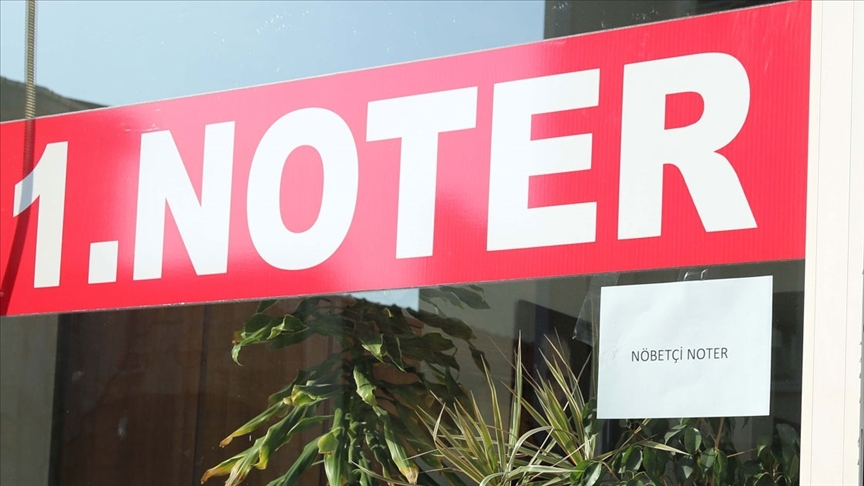Table of Contents
In this article, I will be sharing my experience with Notarization in Turkey, commonly known as Noter. I’ll give you an overview of what a Noter is, its vital role in various legal transactions, and how to navigate these services as a foreigner or resident.
Whether you’re dealing with property matters, vehicle transactions, or need a document notarized, this article will help clarify the notarization process in Turkey and highlight the significance of Noters in ensuring the authenticity and legal standing of your documents.
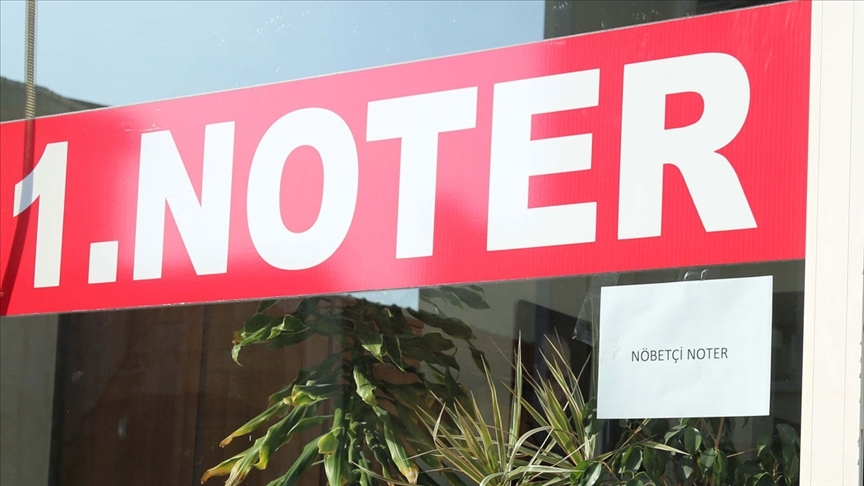
What is a Noter?
When living or visiting Turkey, you’ll soon find out that Noter (the Turkish term for a Public Notary), is your go-to place for legally authenticating a wide range of documents. My personal experience over the past 7 years sheds light on what you can expect from these essential services:
- Certified Documents: Couldn’t imagine getting translations for my passport without visiting a Noter. They also certify IDs, evlilik cüzdanı (marriage certificates), and birth records.
- Trade Agreements: They’re crucial in sealing the deal with signatures and şirket mühürleri (company seals).
- Real Estate Transactions: Whether you’re buying, selling, or renting, a Noter must authenticate the paperwork.
- Vehicle Transactions: If you’re in the market for a new or used car (araba), the notary is part of this transaction too.
To sum it up, they authenticate translated documents for official use. Whether you need a service in Istanbul, Ankara, or Izmir, or any smaller town, you’ll easily find a local Noter. The assurance that comes with their stamp is invaluable when navigating official matters in Turkey.

How to find a notary in Turkey?
Indeed, there are multiple resources you can tap into to find a Noter in Turkey, especially handy for foreigners:
- Online Directories: The Türkiye Noterler Birliği (Chamber of Notaries of Turkey) offers an online directory. Similarly, the Adalet Bakanlığı (Ministry of Justice of Turkey) provides a list with contact information. You can easily search by city or region to pinpoint a Noter close to you.
- Google Maps: A more user-friendly approach might be to use Google Maps. Simply typing “noter” into the search bar will reveal nearby notaries along with their reviews and hours of operations, which can be particularly useful for finding convenient locations and times.
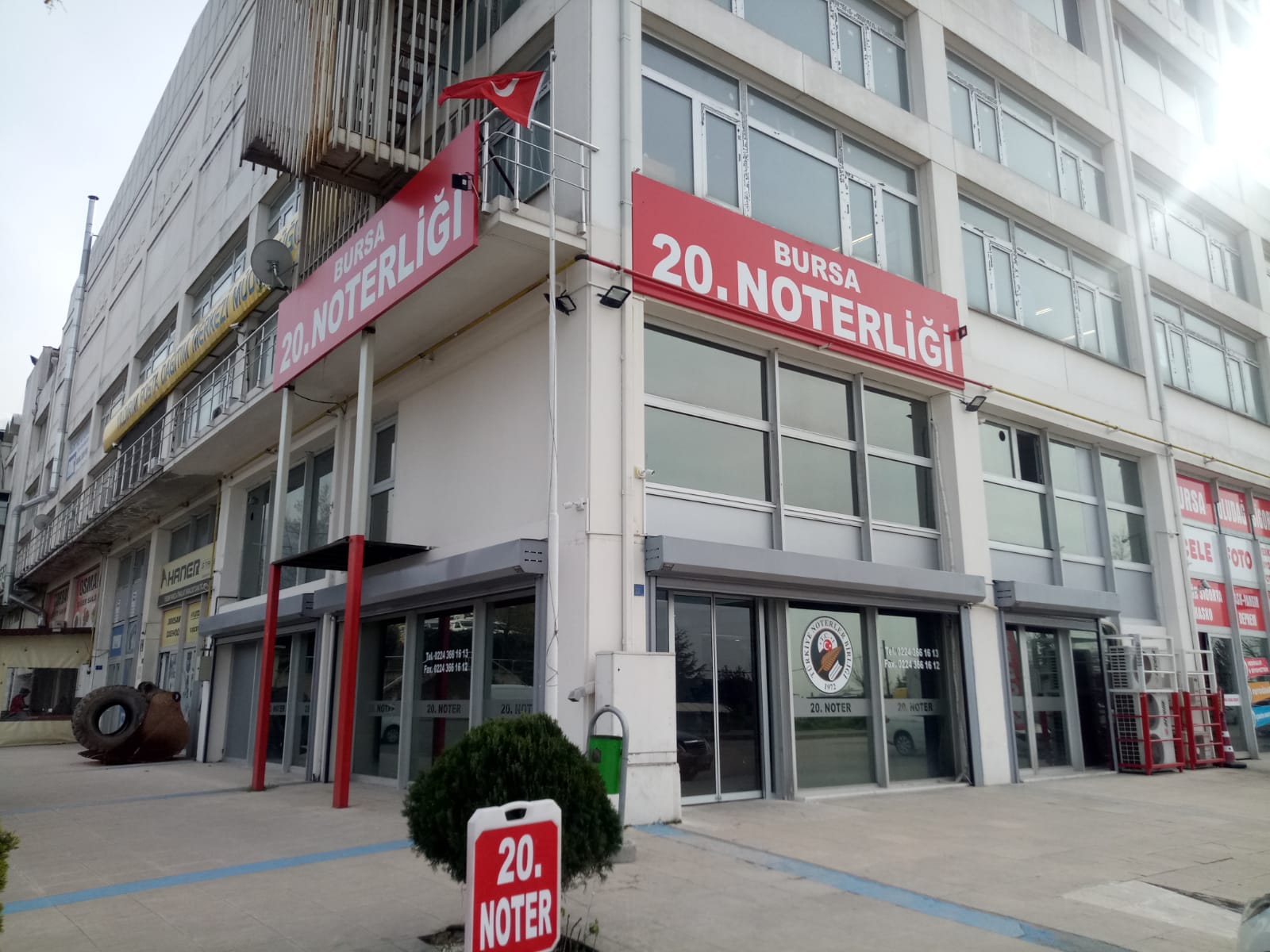
A “noter” or notary office in Turkey can often be recognized by distinctive signage. For foreigners seeking notarial services, one of the indicators to look for is a large red sign with white lettering.
In the image provided, the sign reads “BURSA 20. NOTERLİĞİ” which translates to “Bursa 20th Notary Office”. Such signs are usually placed prominently above the office entrance, making them visible from a distance. Additionally, the Turkish flag and the notary’s office number, in this case, “20”, are also displayed, which further signifies the official nature of the establishment. This numbering system helps to differentiate each notary office within a city.
Look for these signs on building facades, especially in commercial areas where professional services are commonly found.
Remember, it’s important to check the working hours as they may vary and it’s always helpful to call ahead to verify if an appointment is necessary. This little bit of prep work can save you time and make the process of notarizing documents in Turkey much smoother.
Working hours
If you’re in Turkey and need to visit a Noter for any official business, here are some key points about their operating hours that you should keep in mind:
- Weekday Hours: Notaries generally operate from 09:00 to 17:00 on weekdays. However, some regional variations could extend the hours slightly, with notaries opening as early as 08:30 and closing at 17:30.
- Weekend Operations: Wondering “Hafta sonu noter çalışıyor mu?” (Does the notary work on the weekend?) The answer is yes, there are notaries on duty on Saturdays and Sundays, typically available from 10:00 to 16:00.
- Lunch Breaks: The lunchtime for Noter offices is generally between 12:30 and 13:30. Plan your visit accordingly to avoid waiting during their break time.
And a couple of additional points to keep in mind for special days:
- Sundays: On weekends, while there are on-duty notaries available, it’s a good idea to check if the hours differ in your region.
- Public Holidays: During bayramlar (religious and national holidays), most notaries are closed. Some might open for half a day, particularly on the eves of such holidays, but it’s best to call and confirm.

On-duty Notaries
Nöbetçi Noter (notary on duty) offers weekend notary services in Turkey, which began on April 6, 2019. This service is especially handy for those with weekday commitments, allowing for notarial tasks on Saturdays and Sundays, particularly useful for second-hand vehicle sales. On-duty notaries work from 10:00 to 16:00 over the weekend. Always verify the nearest on-duty notary’s location and hours before your visit for a hassle-free experience.

Notarization Process in Turkey
Here’s how you can navigate Notarization Process in Turkey:
- Prepare Your Documents: I remember once rushing to the Noter, only to realize I’d forgotten a key document. It’s a lesson well-learned: always double-check your documents before you leave home. It saves not just time but also those unnecessary headaches!
- Visit the Noter: With your documents and ID in hand, find a local notary’s office. Thankfully, they’re widespread and easy to locate.
- Request Services: Clearly state your needs, whether that’s a tasdik (attestation) or Vekaletname (Power of attorney).
- Pay the Fee: Costs vary, but investing in official validity is non-negotiable.
Throughout my time in places like Istanbul or smaller towns, I’ve found notaries to be efficient and crucial for smooth legal transactions. Whenever you need your papers officially recognized, the Noter is your ally.
Translators in Noter
Sworn translators in Turkey play a crucial role in the notarization process, especially for those needing official translations for legal purposes. If you require a notarized or sworn translation, it means that a translator—already sworn in at a Noter (Public Notary)—must undertake the translation.
When engaging with a Noter yeminli tercüman (Notary sworn translator) in Turkey, there are a couple of essential services they provide:
- Document Translation: A sworn translator is authorized to translate your official documents into Turkish. This is particularly important for documents like birth certificates, academic records, or any paperwork that requires official recognition by Turkish authorities.
- Live Translation Services: If you are drafting significant documents like a Vekaletname (Power of Attorney) at the notary and you do not speak Turkish fluently, the sworn translator can join you at the Noter to provide live verbal translation. This ensures you fully understand the contents and implications of the document before signing.
Remember: It’s vital to have a sworn translator who is recognized by the specific Noter office where you need your documents processed.Double-check that their credentials are accepted at the Noter to avoid any delays or complications.
Notary Fees in Turkey $ € ₺
Here’s a brief overview of some notary fees in Turkey as of 2023, keeping it concise and to the point:
| Fee Category (English) | Fee Category (Turkish) | Fee in TL | Fee in USD | Fee in EUR |
|---|---|---|---|---|
| Document Drafting Fee | Düzenleme ücreti | 783.82 TL | $27.03 | €24.88 |
| Translation Fee | Çevirme ücreti | 196.62 TL | $6.78 | €6.24 |
| Safekeeping of Deposits Fee | Emanetlerin saklanması ücreti | 54.88 TL | $1.89 | €1.74 |
| Writing Fee | Yazı ücreti | 23.76 TL | $0.82 | €0.75 |
| Comparison Fee | Karşılaştırma ücreti | 23.76 TL | $0.82 | €0.75 |
| Fee for Exempt Transactions and Expropriation Notices | Harç, damga vergisi ve resimden muaf işlemlerle kamulaştırma tebliğlerinde noter ücreti | 19.90 TL | $0.69 | €0.63 |
| Notary Service Fee | Noter ücreti | 17.32 TL | $0.60 | €0.55 |
| Electronic Detection Fee | Elektronik Tespit Ücreti | 10.60 TL | $0.37 | €0.34 |
| Registration Fee | Tescil ücreti | 7.42 TL | $0.26 | €0.24 |
| Book Certification Fee | Defter onaylama ücreti | 7.42 TL | $0.26 | €0.24 |
| Notification Writing Fee | Bildirim yazı ücreti | 7.42 TL | $0.26 | €0.24 |
| Brokerage Fee | Aracılık ücreti | 5.30 TL | $0.18 | €0.17 |
These are standard rates and it’s always wise to confirm the exact charges for the services you require directly with the Noter or through their official channels.
Important papers I notarized in Turkey
Rent Contract
When applying for a residence permit (ikamet), the Göç İdaresi (Immigration Office) often requires a notarized Kira Sözleşmesi (Rent Contract). In my experience, this meant having to arrange a meeting with the homeowner at the Noter to get the necessary attestation.
This step is crucial since without a notarized contract, the residence permit process may stall. It’s a good idea to ensure both parties understand the appointment time and requirements to avoid delays. With the notary’s official stamp, my contract was ready to be submitted, paving the way for a smooth residency application.
In the following Image you can see an attested rent contract that I have made before.
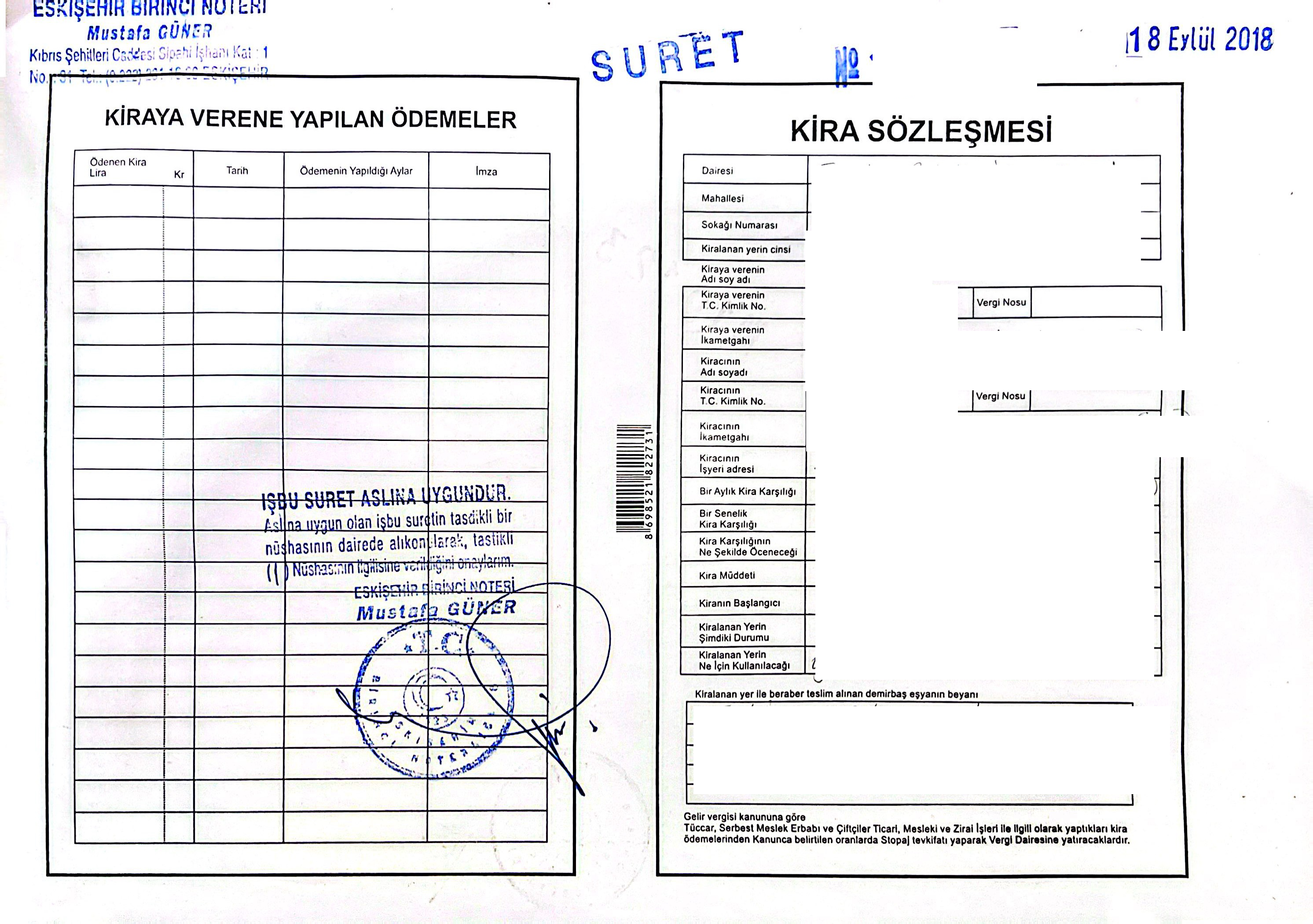
Personal identity and passports
Notarization is indeed crucial when it comes to vital documents like your personal identity and passport. It assures that these documents are genuine and have not been altered in any unauthorized manner.
From my own experience, I’ve had my passport translated several times and subsequently attested by a Noter. Here’s a key tip: not every notary will accept translations from any translator. You must use a yeminli tercüman (sworn translator) that the Noter recognizes. So, make sure to ask the Noter which translators they work with before getting your translation done.
If you need to inquire about translators at the notary, you could use the following sentence:
- “Hangi yeminli tercümanları tanıyorsunuz?” (Which sworn translators do you recognize?)
This helps to ensure that your process is seamless and your documents are readily accepted for notarization.
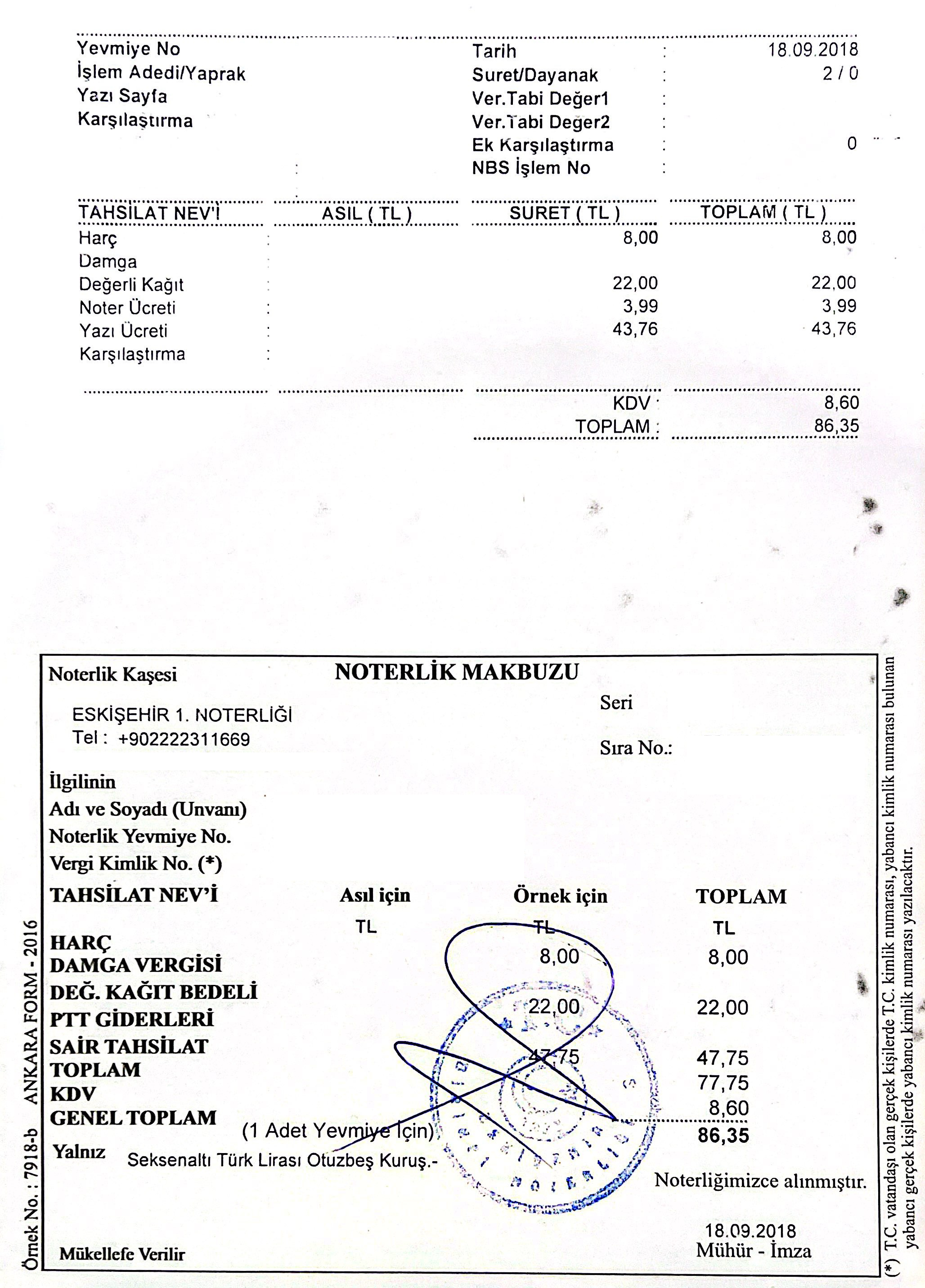
Invitation requests to visit Turkey (Taahhütname)
If you’re planning to invite someone to visit Turkey, you’ll need to make a Taahhütname, which is a formal invitation letter. This document requires notarization to verify its authenticity and to make certain that all responsibilities and commitments of the inviting party are clear and legally binding.
Power of attorney (Vekaletname)
Creating a Power of Attorney (or Vekaletname) is a common requirement for various legal procedures in Turkey. If you’re visiting a Noter to do this, here’s how it typically goes:
As a foreigner, I simply visit the Noter and request a Vekaletname by stating:
- “Vekaletname hazırlamak istiyorum.” (I would like to prepare a Power of Attorney.)
Since you’re not a native Turkish speaker, Noter employees are required to verify your Turkish language proficiency. This is important because it’s essential that you fully grasp the gravity of the document you’re signing. Personally, speaking Turkish fluently meant there were no additional steps for me. However, for those who don’t speak Turkish well, the Noter will arrange for a yeminli tercüman (sworn translator) to ensure you understand the Vekaletname’s content.
Remember, using the services of a translator means there will be an additional fee, but this cost is a safeguard to ensure that all parties involved have a clear understanding of the agreement being authorized. It’s a worthwhile investment for peace of mind when handling legal documents in a foreign language.
Getting a Copy of Notarized Documents
Imagine you’ve lost a crucial notarized document – a situation I’ve unfortunately experienced. The good news is, getting a copy is straightforward. Just head back to the Noter where you originally got it notarized and ask for a ‘noter tasdikli suret’ or a notarized copy.
- Visit the same notary office (Noter) where the original document was notarized.
- Ask for a ‘noter tasdikli suret’, which means a notarized copy.
- You may need to prove your identity and your relation to the document, so bring identification and any relevant information.
- The notary will provide you a certified true copy, which has the same legal validity as the original.
This saves you the effort of going through the initial process again and ensures that you have a legally recognized duplicate of your notarized paper.
